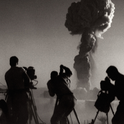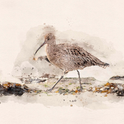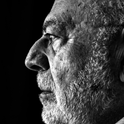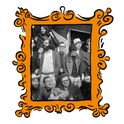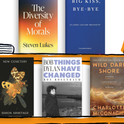The last time they met, the Uyghur poet Tahir Hamut Izgil and his novelist friend Perhat Tursun spent the evening together in a bookstore in Urumqi, China. Almas, the bookseller, was obliged by the police to wear a red armband and to keep a whistle and a truncheon handy, ready to leap into action whenever the authorities decided there was a threat in the neighbourhood. At that moment, however, there were few customers. Almas passed his time peacefully translating a Chinese edition of Bertrand Russell’s History of Western Philosophy into Uyghur.
As they left the bookstore late that night, Izgil whispered to Tursun the news of a mutual friend’s arrest. It was not a surprise: the year was 2017 and successive waves of arrests had already cut a wide swathe through Urumqi’s poets, writers and public intellectuals. Nevertheless, the news came as a blow to Tursun. Declining an offer of a taxi, he told his friend that he would walk home through the backstreets. It was safer that way, he said.
The news that Izgil could not share that night was that he was secretly planning to leave the country. By 2020, he was in the US with his family; Almas had disappeared into the detention camps and his bookstore was closed; and Tursun had been sentenced to 16 years in prison.
In the acknowledgments to his powerful memoir Waiting to be Arrested at Night, Izgil pays tribute to his lifelong friend: “The suffering he is now undergoing,” he writes of Tursun, “has spurred me to the writing of this memoir.” Poignantly, given their parting words, Tursun’s last novel, published in English translation last year, is called The Backstreets. Together, these two books conjure a tragic and unforgettable picture of the destruction of a once vibrant culture, and the brutal persecution of its practitioners.
The Backstreets was first published online in 2013. Reading it with the benefit of hindsight, it is a remarkably prophetic piece of literature; an evocative, modernist text that plunges the reader into a dystopian city, shrouded in darkness and fog, through which the narrator struggles to understand the unexplained phenomena that he can dimly see. He wanders through this landscape in a state of perpetual displacement and dislocation. “Everything around me seemed to disappear,” he observes, “and a sudden feeling of horror came over me as if I were trapped, suspended in the air.”
On the first day of 2013, the poet Izgil had received a phone call from Ilham Tohti, a celebrated Uyghur economist who lived and worked in Beijing. Tohti was excited: Xi Jinping had come to power in China, and he was sure this meant that things would get better for the Uyghurs. After all, he recalled, the new leader’s father had publicly criticised Beijing’s repressive policies. A year later, Tohti was sentenced to life in prison; all his possessions were confiscated and his family left destitute and under constant surveillance.
Life had never been easy for either Tursun or Izgil. Tursun was born in southwest Xinjiang in 1969, in the middle of the Cultural Revolution, during which his father, a schoolteacher, was imprisoned as a suspected counter-revolutionary. One of Izgil’s earliest memories, also from the Cultural Revolution, was of offering water to a man tied to a tree under a searingly hot sun, after being paraded as a criminal through the streets for listening to a Russian radio broadcast of Uyghur folk songs. Moscow and Beijing, now limitless friends, were mortal enemies at the time.
By the 1980s, Mao Zedong was dead, the Cultural Revolution was over and China was rediscovering the history and culture that Mao had banned: it was a decade of exploration and experimentation both for the Han majority and many “minority” nationalities in China, including the Uyghurs, as the nation began to process the traumas of the Mao years.
Tursun, who had been writing poetry since his schooldays, was studying in Beijing, where for the first time he encountered western modernist writers who had been translated into Chinese—but not Uyghur. He read avidly, developing a passion for such figures as Kafka, Nabokov and Faulkner, as well as the German philosopher Arthur Schopenhauer, along with Jung and Freud.
In 1998, back in Urumqi, he published a poetry collection, One Hundred Love Lyrics; earned a PhD in Turkic literature with a dissertation on Sufi poetics; and published a volume of stories entitled Messiah Desert. His novel The Art of Suicide, published in 1999, caused a scandal in conservative Uyghur society for both its modernist prose and its unflinching treatment of sexuality, mental illness and suicide. He was accused of anti-Islamism, a charge that resulted in threats, book-burning, publication bans and the end of his marriage.
Izgil, too, had been a poet since his schooldays and also studied in Beijing in the 1980s, taking part in the student occupation of Tiananmen Square and surviving the massacre that killed the hopes of a generation. He returned to Urumqi and taught Chinese language until, in 1996, he was arrested as he tried to leave the country to study in Turkey. He spent three years in prison, having confessed under torture to attempting to smuggle state secrets abroad. On his release, he rebuilt his life as a film producer and director, working with scripts written by, among others, his friend Tursun.
Their lives remained entwined, as together they suffered the steadily deepening repression of Uyghur culture. After the Urumqi riots of 2009, which had been provoked by the murders of Uyghur migrant workers by a Chinese mob in Guangdong province, controls tightened. The “Strike Hard” campaign that followed brought more inward Han migration, along with the demolition of mosques and Uyghur homes, and in turn provoked another violent response in 2014, when knife-wielding Uyghur attacked Chinese in a series of incidents.
He and others take to sleeping next to clothes that they can hastily put on if the doorbell rings in the night
By then, Izgil recalls, people he knew from his prison days were being visited by police, and any contact with the world beyond China’s borders was cause for suspicion. The sale of shortwave radios was banned; butchers were struggling to cut meat with knives that were chained to the block; films and novels that had previously been approved were coming under renewed scrutiny and retroactively banned. Izgil purged his laptop of any trace of foreign connections or literature, and deleted the virtual private network, or VPN, that had given him access to external sources of news. “I began,” he writes, “to feel like a frog in a well.”
The two friends had organised a series of get-togethers of fellow poets to celebrate the art of poetry over food and drink. On the third such meeting, the police were waiting outside. All the participants’ names were taken. The poets never gathered again.
Waiting to be Arrested at Night is a compelling account of Izgil’s ultimately successful escape to the US. It is a story of mounting fear, as friends disappear one by one, and he and others take to sleeping next to a pile of warm clothes that they can hastily put on if the doorbell rings in the night. If that were to happen, he knew that the journey would end on the concrete floor of a crowded cell.
Izgil’s escape succeeded against heavy odds, and he was living safely in Washington with his family when the news of Tursun’s arrest and sentencing was confirmed. Tursun is among the most celebrated Uyghur writers now in prison, but there are many others, along with musicians, publishers and public intellectuals.
Among the cases PEN International has listed are those of the translator Ahmetjan Juma, sentenced in 2019 to 14 years in jail for the possession of a banned book; the writer Ahtam Omer, sentenced to 20 years on separatism charges; the 80-year-old poet Haji Mirzahid Kerimi, detained with 14 colleagues from the Kashgar Publishing House, who reportedly died in detention; the scholar of Uyghur folklore Rahile Dawut, who disappeared in 2017.
The Backstreets and Waiting to be Arrested at Night speak both for them and the million others who were and still are detained in China’s camps.


